When most people think of the Marines, they think one thing: killers.
While it is true that the Marines are the most lethal of all of the military branches, what most don’t realize is that there are some really good benefits to joining.
The purpose of this article is to discuss some of the benefits that are not often talked about when thinking about joining the Marines.
These benefits will not only help for your transition to the military world but in some cases can even help your spouse or loved ones.
Here are 7 of the best benefits of joining the Marine Corps:
#7: Housing
While Marine barracks aren’t exactly the Plaza Hotel in NYC, there’s one thing about them that separates them from the competition: they’re free.
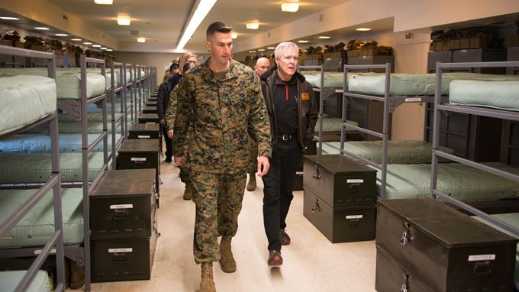
You can live and work on any of the dozens of Marine Corps bases in the US completely rent-free.
What most people don’t realize is, not all Marines live in barracks.
If approved, you can actually live off base in an apartment, condo, or home.
The US Military offers subsidized housing to all branches of the military, the US Marines included.
It’s called the Basic Allowance Housing, or BAH, and it’s essentially a “bonus” on top of your regular pay.
How much you’ll receive is based on 3 factors:
- Geographic Duty Location
- Pay Grade (IE Rank)
- Dependency Status
Obviously certain parts of the country are way more expensive than others.
For example, if you were stationed in Honolulu, Hawaii, the monthly allowance for a Corporal (E-4) is $2,139 without dependents, and $2,850 with dependents.
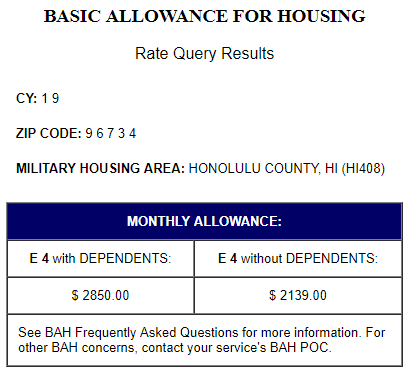
However, if you were based in Camp Lejune in North Carolina, that number drops to $996 without dependents and $1,146 with dependents.
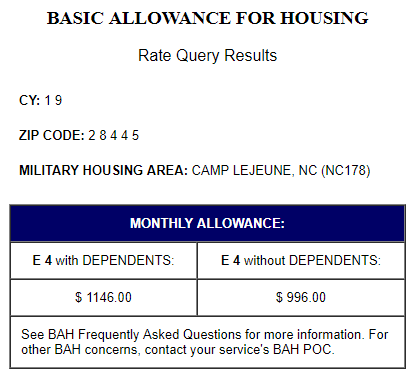
You can determine exactly how much you’ll get with the Department of Defense BAH calculator here.
The goal of the BAH is to make it so you literally live rent-free, and is one of the biggest benefits to joining the Marines.
#6: GI Bill
We get it, college can be expensive. In fact, the average public four-year tuition for out of state students rose to $23,890 per year in 2017. (Source)
There are literally millions of college students graduating every year with a degree in one hand, and a massive student loan debt in the other.

That’s where the GI Bill comes in.
Originally introduced as the 1944 Servicemen’s Readjustment Act, the GI Bill is an educational benefit offered to members of the military that are serving in an Active Duty, Reserve, or National Guard role.
Without getting too much into the specifics, the GI Bill is designed to help you pay a good chunk of your college or trade school tuition.
Related Article: 17 Scholarships For Military Children, Spouses, and Veterans
Your recruiter will have way more details than what I can provide you here, but with the GI Bill, you will essentially graduate college relatively debt-free.
#5: Benefits For Your Spouse
An often overlooked benefit of serving in the Marine Corps is your spouse.

While most Marines enter the service without a spouse, it’s a fact that a good portion of Marines will end up with a family sometime during their career.
Some of the benefits afforded to Marine spouses include things like:
- Military Spouse Preference Program (MSP): This program essentially gives military spouses head of the line privileges when applying for Department of Defense civilian job opportunities. Keep in mind that it only applies to spouses of active-duty service-members, sorry reservists!
- Added GI Bill benefits: Some Marines simply don’t want to go to college for one reason or another. What’s nice about the GI bill is that you can actually transfer it to your spouse and/or children.
- Small business loans: As part of the Patriot Express Pilot loan, military spouses are eligible for loans of up to $500,000 to start a new business.
- Military discounts: As a spouse, you can be entitled to all sorts of discounts at a wide variety of retail stores.
- Recreation benefits: Since you’ll have an official military ID issued to you, you’ll be able to enjoy most of the same perks that active-duty personnel are afforded. These include access to on-base recreation facilities like gyms, pools, tennis courts, and much more.
- Childcare services: Some of the larger Marine bases in the US offer childcare / babysitting services for a small nominal fee.
While having a spouse that’s serving in the military can be difficult, the Marines do all they can to help with your overall quality of life.
Related Article – 10 Benefits Of Being A Military Wife (and 5 not-so good things)
Some of these benefits transfer over to your immediate family as well, like your parents for instance.
#4: Kick-A$$ Uniforms
There are no two ways about it, the Marine’s uniforms are just bad-ass.

Just walking around town in your dress blues will get you noticed, and it’s widely known that the Marines have some of the coolest uniforms out of all of the branches of the military.
In the Marines, you’ll actually be issued three types of uniforms:
- Field: These include combat utility, flight suit, and mountain warfare, with the most common one being the combat utility. These are basically the cool looking camo uniforms you see Marines wearing.
- Dress: These are the types of uniforms Marines wear to social functions, parades, and ceremonies. They include the blue coat with sky blue trousers and slacks that you’re so accustomed to seeing Marine recruiters wearing.
- Service: Service uniforms are another type of uniform that are used for social events and parades, and are identified by their unique khaki shirts with green trousers and slacks.
In addition, you’ll also receive all of the other basics like socks, shorts, PT gear, boots, and more.
While the uniforms alone shouldn’t be your #1 reason for signing up for the Marine Corps, it certainly can help make your decision a bit easier!
#3: Healthcare And Insurance
Like college, healthcare in the United States is very expensive.
According to CNBC, the average healthcare premium costs around $321 per month for an individual, and $833 a month for family plans.
On top of that, the average annual deductible for individual plans is $4,358, and $7,983 for family plans.
For a family with an average annual income of $59,039, these costs can quickly add up.
Do you know how much healthcare costs while you’re serving in the Marines?
$0…
That’s right, you won’t pay a dime.

All US Marines (and service members in general) are provided with free comprehensive medical care.
It’s also worth noting that most military doctors are highly trained, and experts in their field.
So you know you’ll be getting quality medical care.
Related Article – Military OneSource: Your Go-To Guide
In addition, you’ll also be provided with heavily-subsidized dental care, should you choose to use it.
These benefits also transfer to your immediate family as well (IE your spouse and children), under the Tricare program.
#2: Pay
While you won’t get rich serving in the Marine Corps, you certainly won’t be left out on the street either.
The pay in the military is the same for every branch (including the Marine Corps), and is dictated by your rank and length of service.
For a private who is literally just entering boot camp (E-1), you can expect to take home $1,680 a month.
See the Marines Pay scale for E-1 through E-5 2019 rates below:
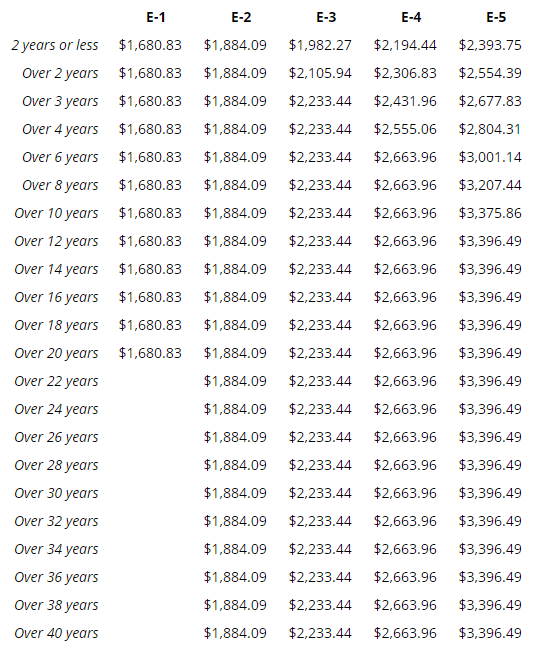
While this may not sound like a lot, you have to consider all of the other benefits that we discussed above that you will save money on.
Things like:
- Free / subsidized housing
- Free medical
- Subsidized food
- Access to gym equipment
- Ancillary benefits
These are things that you normally would have to pay for, all provided nearly free of charge.
#1: Retirement
While most guys and gals enlisting in the Marines don’t think about turning it into a career, it’s certainly a good idea to consider it.
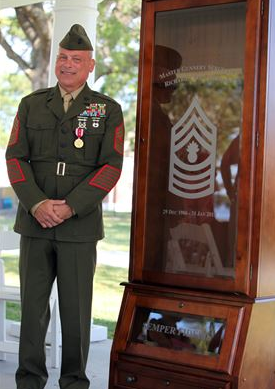
The way it works in the Marines is like this:
You serve on active duty for 20 years, and if you decide to retire on the day after 20 years, you will receive a monthly check for the rest of your life.
Obviously the pay is contingent on a wide variety of factors, including:
- Exactly how long you served
- What rank you achieved
- Whether or not you served in an active-duty or reserve capacity
- Several other factors
For example, a Marine that served for 30 years and retired as a Gunnery Sergeant (E-7) could expect to receive over $4,000 a month.
Related Article: 15 Best States For Military Retirees And Veterans
Keep in mind that this pay does increase year over year to adjust for inflation.
So while it might be $4,000 a month now, 10 years from now it could be way higher.
But the bottom line is this: If you served in the Marine Corps for 20 years, you will be provided with a guaranteed check every month for the rest of your life.
Not a bad deal if you ask me!
Related Articles
Pros and Cons of Joining The Navy
Pros and Cons of Joining The Air Force
Pros and Cons of Joining The Army
Pros and Cons of Joining The Coast Guard
References:
https://www.military.com/education/gi-bill/learn-to-use-your-gi-bill.html
https://bigfuture.collegeboard.org/pay-for-college/college-costs/college-costs-faqs
- Marine Corps Boot Camp Schedule - June 20, 2024
- What To Bring To Marine Boot Camp - June 20, 2024
- Marine Corps Promotion Timeline for Enlisted & Officers - June 19, 2024
General FAQ
What are the benefits of being in the Marines?
The U.S. military offers a competitive salary, military housing or housing allowance, food allowance, free uniforms, medical care for you and your family, educational benefits, retirement plans, and affordable life insurance.
What does a Marine get paid?
Like all branches of the U.S. military, Marines are paid according to rank and time in service. Currently, a new recruit with the rank of E-1 and less than two years in service receives a base pay of $1,680 per month.
Do Marines get free flights?
Marines and their family members can utilize Space-A (space available) flights for little to no cost. While the flights are usually free, they may be subject to taxes or fees.
Do Marines pay taxes?
Military members are taxed on base pay unless they’re an enlisted member or warrant officer serving in a combat zone. For officers, the taxable amount is capped. Allowances, such as housing, food, and family separation pay are non-taxable?
How many vacation days to Marines get?
Marines, and other service members, get 30 days of "leave" (paid vacation) per year. It accumulates at a rate of 2.5 days per month. Overage can be sold back at the time of reenlistment, separation, or retirement.
